Louis Lazare Hoche (24 June 1768 – 19 September 1797) was a French soldier who rose to be general of the Revolutionary army.
Born of poor parents near Versailles, he enlisted at sixteen as a private soldier in the Gardes Françaises.
he enlisted at sixteen as a private soldier in the Gardes Françaises. 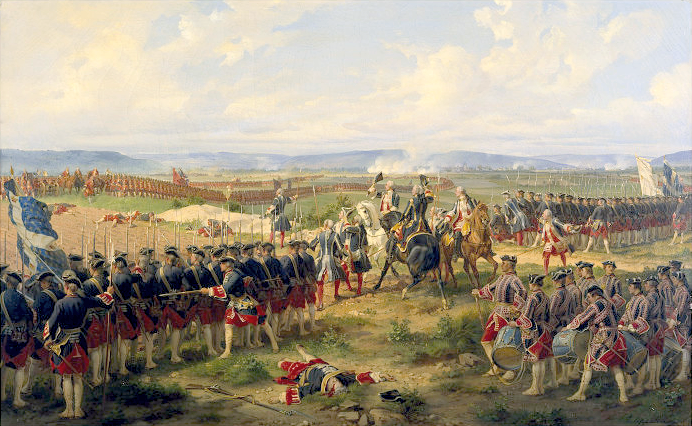 He spent his entire leisure in earning extra pay by civil work, his object being to provide himself with books, and this love of study, which was combined with a strong sense of duty and personal courage, soon led to his promotion.
He spent his entire leisure in earning extra pay by civil work, his object being to provide himself with books, and this love of study, which was combined with a strong sense of duty and personal courage, soon led to his promotion.
When the Gardes françaises disbanded in 1789 he had reached the rank of corporal, and thereafter he served in various line regiments up to the time of his receiving a commission in 1792. In the defence of Thionville in that year Hoche earned further promotion,
in that year Hoche earned further promotion,  and he served with credit in the operations of 1792 - 1793 on the northern frontier of France, including the Battle of Wissembourg. At the Battle of Neerwinden (1793)
and he served with credit in the operations of 1792 - 1793 on the northern frontier of France, including the Battle of Wissembourg. At the Battle of Neerwinden (1793) he served as aide-de-camp to General le Veneur, and when Charles Dumouriez
he served as aide-de-camp to General le Veneur, and when Charles Dumouriez deserted to the Austrians, Hoche, along with le Veneur and others, fell under suspicion of treason. But after being kept under arrest and unemployed for some months he took part in the defence of Dunkirk,
deserted to the Austrians, Hoche, along with le Veneur and others, fell under suspicion of treason. But after being kept under arrest and unemployed for some months he took part in the defence of Dunkirk, and in the same year (1793) he was promoted successively chef de brigade, general of brigade, and general of division. In October 1793 he was provisionally appointed to command the Army of the Moselle,
and in the same year (1793) he was promoted successively chef de brigade, general of brigade, and general of division. In October 1793 he was provisionally appointed to command the Army of the Moselle,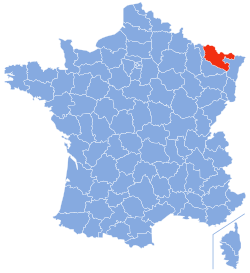 and within a few weeks he was in the field at the head of his army in Lorraine.
and within a few weeks he was in the field at the head of his army in Lorraine.
He lost his first battle at Kaiserslautern on 28–30 November 1793 against the Prussians, but even in the midst of the Reign of Terror the Committee of Public Safety retained Hoche in his command. Pertinacity and fiery energy, in their eyes, outweighed everything else, and Hoche soon showed that he possessed these qualities.
On 22 December 1793 he stormed the lines of Fröschweiler, and the representatives of the National Convention with his army at once added the Army of the Rhine to his sphere of command. On 26 December 1793 the French carried by assault the famous lines of Weissenburg, and Hoche pursued his success, sweeping the enemy before him to the middle Rhine in four days. He then put his troops into winter quarters.
Convention with his army at once added the Army of the Rhine to his sphere of command. On 26 December 1793 the French carried by assault the famous lines of Weissenburg, and Hoche pursued his success, sweeping the enemy before him to the middle Rhine in four days. He then put his troops into winter quarters.
Before the following campaign opened, he married Anne Adelaide Dechaux at Thionville (11 March 1794). But ten days later he was suddenly arrested, charges of treason having been preferred by Charles Pichegru , the displaced commander of the Army of the Rhine, and by his friends. Hoche escaped execution, however, though imprisoned in Paris until the fall of Maximilien Robespierre
, the displaced commander of the Army of the Rhine, and by his friends. Hoche escaped execution, however, though imprisoned in Paris until the fall of Maximilien Robespierre . Shortly after his release he was appointed to command against the Vendéans .This was a Royalist rebellion and counterrevolution in the Vendée
. Shortly after his release he was appointed to command against the Vendéans .This was a Royalist rebellion and counterrevolution in the Vendée region of France during the French Revolution. The Vendée is a coastal region, located immediately south of the Loire River in western France. The uprising was closely tied to the Chouannerie,
region of France during the French Revolution. The Vendée is a coastal region, located immediately south of the Loire River in western France. The uprising was closely tied to the Chouannerie,  which took place in the area north of the Loire. Initially, the war was similar to the earlier Jacquerie peasant uprising,
which took place in the area north of the Loire. Initially, the war was similar to the earlier Jacquerie peasant uprising,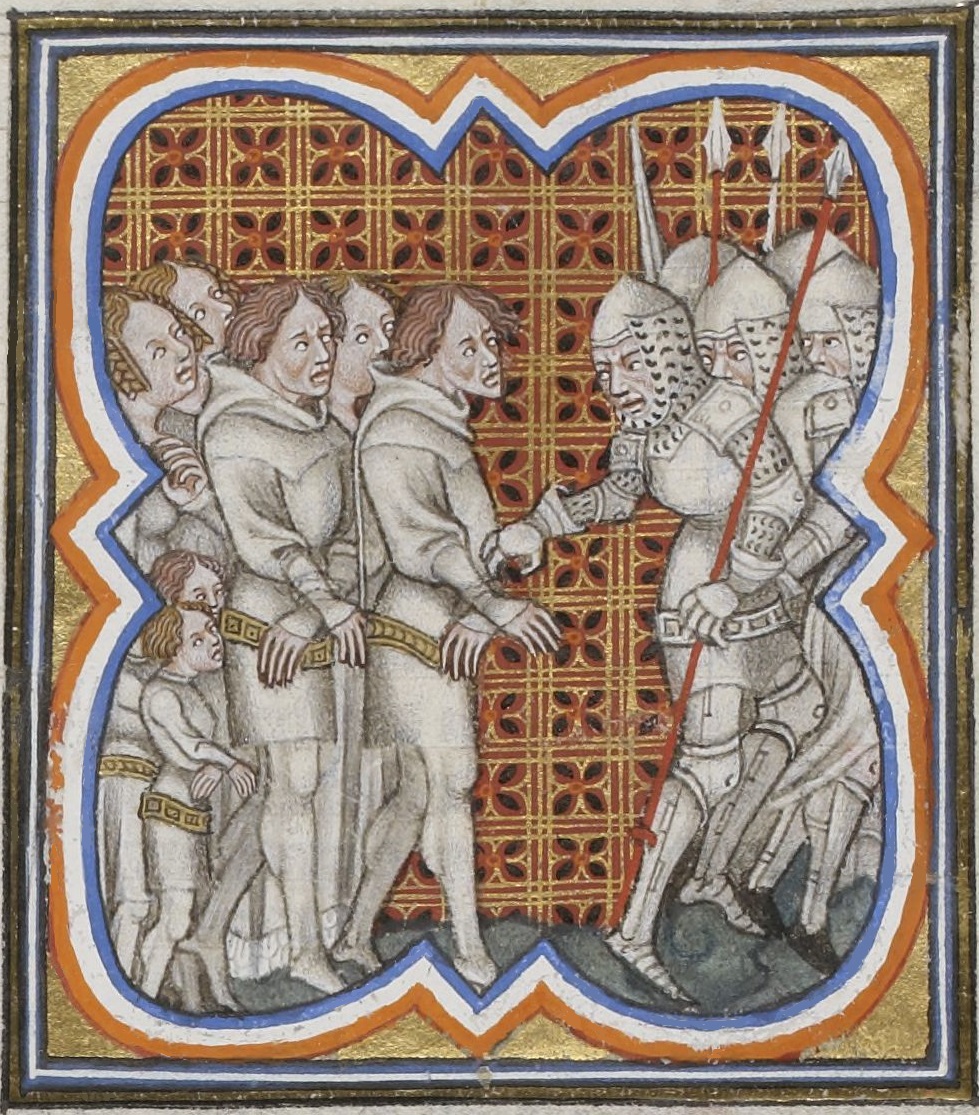 but quickly took on counterrevolutionary themes. The nature of the uprising has been heavily disputed by historians since the nineteenth century. Reynald Secher popularized the view that the killing of Catholic Vendeans by the anticlerical French state at the end of the war was the first modern genocide, but this claim has been widely discounted.
but quickly took on counterrevolutionary themes. The nature of the uprising has been heavily disputed by historians since the nineteenth century. Reynald Secher popularized the view that the killing of Catholic Vendeans by the anticlerical French state at the end of the war was the first modern genocide, but this claim has been widely discounted. (21 August 1794). He completed the work of his predecessors in a few months by the peace of Jaunaye (15 February 1795), but soon afterwards the war was renewed by the Royalists. Hoche showed himself equal to the crisis and inflicted a crushing blow on the Royalist cause by defeating and capturing de Sombreuil's expedition at Quiberon
(21 August 1794). He completed the work of his predecessors in a few months by the peace of Jaunaye (15 February 1795), but soon afterwards the war was renewed by the Royalists. Hoche showed himself equal to the crisis and inflicted a crushing blow on the Royalist cause by defeating and capturing de Sombreuil's expedition at Quiberon and Penthièvre (16–21 July 1795). Thereafter, by means of mobile columns (which he kept under good discipline) he succeeded before the summer of 1796 in pacifying the whole of the west, which had for more than three years been the scene of a pitiless civil war.
and Penthièvre (16–21 July 1795). Thereafter, by means of mobile columns (which he kept under good discipline) he succeeded before the summer of 1796 in pacifying the whole of the west, which had for more than three years been the scene of a pitiless civil war.
After this Hoche was appointed to organise and command the troops sent to assist the United Irishmen in their rebellion against British rule.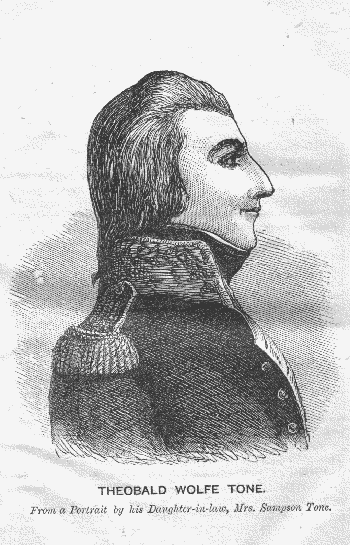 A tempest, however, separated Hoche from the expedition, and after various adventures the whole fleet returned to Brest
A tempest, however, separated Hoche from the expedition, and after various adventures the whole fleet returned to Brest without having effected its purpose. Hoche was at once transferred to the Rhine frontier, where he defeated the Austrians at the Battle of Neuwied in April 1797, though operations were soon afterwards brought to an end by the Preliminaries of Leoben.
without having effected its purpose. Hoche was at once transferred to the Rhine frontier, where he defeated the Austrians at the Battle of Neuwied in April 1797, though operations were soon afterwards brought to an end by the Preliminaries of Leoben.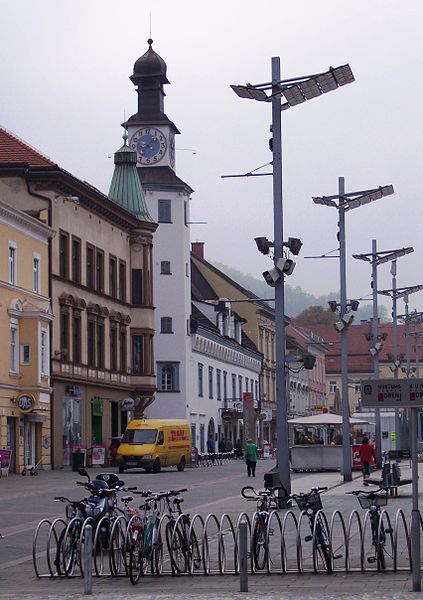 Later in 1797 he was minister of war for a short period, but in this position he was surrounded by obscure political intrigues, and, finding himself the dupe of Paul Barras
Later in 1797 he was minister of war for a short period, but in this position he was surrounded by obscure political intrigues, and, finding himself the dupe of Paul Barras and technically guilty of violating the constitution, he quickly laid down his office, returning to his command on the Rhine frontier. But his health grew rapidly worse, and he died at Wetzlar
and technically guilty of violating the constitution, he quickly laid down his office, returning to his command on the Rhine frontier. But his health grew rapidly worse, and he died at Wetzlar on 19 September 1797 of consumption. The belief spread that he had been poisoned, but the suspicion seems to have had no foundation. He was buried next to his friend François Marceau
on 19 September 1797 of consumption. The belief spread that he had been poisoned, but the suspicion seems to have had no foundation. He was buried next to his friend François Marceau in a fort on the Rhine.
in a fort on the Rhine.
He is commemorated by a statue in Place Hoche, a gardened square not far from the main entrance to the Palace of Versailles. Another statue, the last major work by Jules Dalou,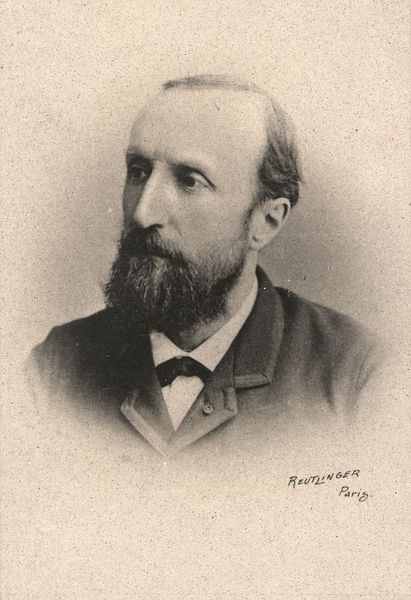 is in Quiberon, Brittany. In Les Invalides where Napoleon's tomb is enshrined, there is also a memorial to Hoche.During the Seven Years War the bay was the site of the Battle of Quiberon Bay
is in Quiberon, Brittany. In Les Invalides where Napoleon's tomb is enshrined, there is also a memorial to Hoche.During the Seven Years War the bay was the site of the Battle of Quiberon Bay between the French and British fleets. In the French Revolution, in July 1795 Quiberon was used by French Royalist exiles, with assistance from the British, as the base for a failed invasion of Brittany
between the French and British fleets. In the French Revolution, in July 1795 Quiberon was used by French Royalist exiles, with assistance from the British, as the base for a failed invasion of Brittany 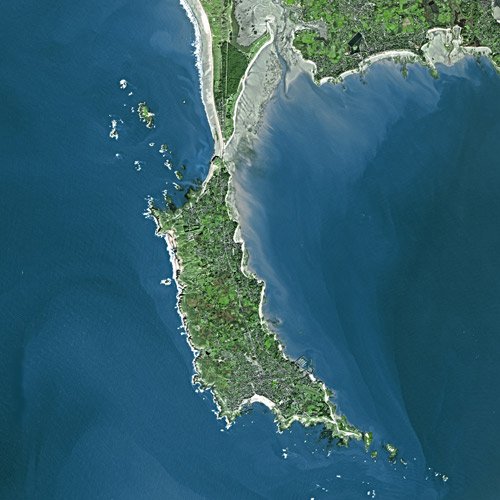 (traditionally a royalist area). The invasion was defeated by the Revolutionaries under Hoche. A station on the Paris Metro is also called 'Hoche.'
(traditionally a royalist area). The invasion was defeated by the Revolutionaries under Hoche. A station on the Paris Metro is also called 'Hoche.'
Born of poor parents near Versailles,
 he enlisted at sixteen as a private soldier in the Gardes Françaises.
he enlisted at sixteen as a private soldier in the Gardes Françaises.  He spent his entire leisure in earning extra pay by civil work, his object being to provide himself with books, and this love of study, which was combined with a strong sense of duty and personal courage, soon led to his promotion.
He spent his entire leisure in earning extra pay by civil work, his object being to provide himself with books, and this love of study, which was combined with a strong sense of duty and personal courage, soon led to his promotion.When the Gardes françaises disbanded in 1789 he had reached the rank of corporal, and thereafter he served in various line regiments up to the time of his receiving a commission in 1792. In the defence of Thionville
 in that year Hoche earned further promotion,
in that year Hoche earned further promotion,  and he served with credit in the operations of 1792 - 1793 on the northern frontier of France, including the Battle of Wissembourg. At the Battle of Neerwinden (1793)
and he served with credit in the operations of 1792 - 1793 on the northern frontier of France, including the Battle of Wissembourg. At the Battle of Neerwinden (1793) he served as aide-de-camp to General le Veneur, and when Charles Dumouriez
he served as aide-de-camp to General le Veneur, and when Charles Dumouriez deserted to the Austrians, Hoche, along with le Veneur and others, fell under suspicion of treason. But after being kept under arrest and unemployed for some months he took part in the defence of Dunkirk,
deserted to the Austrians, Hoche, along with le Veneur and others, fell under suspicion of treason. But after being kept under arrest and unemployed for some months he took part in the defence of Dunkirk, and in the same year (1793) he was promoted successively chef de brigade, general of brigade, and general of division. In October 1793 he was provisionally appointed to command the Army of the Moselle,
and in the same year (1793) he was promoted successively chef de brigade, general of brigade, and general of division. In October 1793 he was provisionally appointed to command the Army of the Moselle, and within a few weeks he was in the field at the head of his army in Lorraine.
and within a few weeks he was in the field at the head of his army in Lorraine.He lost his first battle at Kaiserslautern on 28–30 November 1793 against the Prussians, but even in the midst of the Reign of Terror the Committee of Public Safety retained Hoche in his command. Pertinacity and fiery energy, in their eyes, outweighed everything else, and Hoche soon showed that he possessed these qualities.
On 22 December 1793 he stormed the lines of Fröschweiler, and the representatives of the National
 Convention with his army at once added the Army of the Rhine to his sphere of command. On 26 December 1793 the French carried by assault the famous lines of Weissenburg, and Hoche pursued his success, sweeping the enemy before him to the middle Rhine in four days. He then put his troops into winter quarters.
Convention with his army at once added the Army of the Rhine to his sphere of command. On 26 December 1793 the French carried by assault the famous lines of Weissenburg, and Hoche pursued his success, sweeping the enemy before him to the middle Rhine in four days. He then put his troops into winter quarters.Before the following campaign opened, he married Anne Adelaide Dechaux at Thionville (11 March 1794). But ten days later he was suddenly arrested, charges of treason having been preferred by Charles Pichegru
 , the displaced commander of the Army of the Rhine, and by his friends. Hoche escaped execution, however, though imprisoned in Paris until the fall of Maximilien Robespierre
, the displaced commander of the Army of the Rhine, and by his friends. Hoche escaped execution, however, though imprisoned in Paris until the fall of Maximilien Robespierre . Shortly after his release he was appointed to command against the Vendéans .This was a Royalist rebellion and counterrevolution in the Vendée
. Shortly after his release he was appointed to command against the Vendéans .This was a Royalist rebellion and counterrevolution in the Vendée region of France during the French Revolution. The Vendée is a coastal region, located immediately south of the Loire River in western France. The uprising was closely tied to the Chouannerie,
region of France during the French Revolution. The Vendée is a coastal region, located immediately south of the Loire River in western France. The uprising was closely tied to the Chouannerie,  which took place in the area north of the Loire. Initially, the war was similar to the earlier Jacquerie peasant uprising,
which took place in the area north of the Loire. Initially, the war was similar to the earlier Jacquerie peasant uprising, but quickly took on counterrevolutionary themes. The nature of the uprising has been heavily disputed by historians since the nineteenth century. Reynald Secher popularized the view that the killing of Catholic Vendeans by the anticlerical French state at the end of the war was the first modern genocide, but this claim has been widely discounted.
but quickly took on counterrevolutionary themes. The nature of the uprising has been heavily disputed by historians since the nineteenth century. Reynald Secher popularized the view that the killing of Catholic Vendeans by the anticlerical French state at the end of the war was the first modern genocide, but this claim has been widely discounted. (21 August 1794). He completed the work of his predecessors in a few months by the peace of Jaunaye (15 February 1795), but soon afterwards the war was renewed by the Royalists. Hoche showed himself equal to the crisis and inflicted a crushing blow on the Royalist cause by defeating and capturing de Sombreuil's expedition at Quiberon
(21 August 1794). He completed the work of his predecessors in a few months by the peace of Jaunaye (15 February 1795), but soon afterwards the war was renewed by the Royalists. Hoche showed himself equal to the crisis and inflicted a crushing blow on the Royalist cause by defeating and capturing de Sombreuil's expedition at Quiberon and Penthièvre (16–21 July 1795). Thereafter, by means of mobile columns (which he kept under good discipline) he succeeded before the summer of 1796 in pacifying the whole of the west, which had for more than three years been the scene of a pitiless civil war.
and Penthièvre (16–21 July 1795). Thereafter, by means of mobile columns (which he kept under good discipline) he succeeded before the summer of 1796 in pacifying the whole of the west, which had for more than three years been the scene of a pitiless civil war.After this Hoche was appointed to organise and command the troops sent to assist the United Irishmen in their rebellion against British rule.
 A tempest, however, separated Hoche from the expedition, and after various adventures the whole fleet returned to Brest
A tempest, however, separated Hoche from the expedition, and after various adventures the whole fleet returned to Brest without having effected its purpose. Hoche was at once transferred to the Rhine frontier, where he defeated the Austrians at the Battle of Neuwied in April 1797, though operations were soon afterwards brought to an end by the Preliminaries of Leoben.
without having effected its purpose. Hoche was at once transferred to the Rhine frontier, where he defeated the Austrians at the Battle of Neuwied in April 1797, though operations were soon afterwards brought to an end by the Preliminaries of Leoben. Later in 1797 he was minister of war for a short period, but in this position he was surrounded by obscure political intrigues, and, finding himself the dupe of Paul Barras
Later in 1797 he was minister of war for a short period, but in this position he was surrounded by obscure political intrigues, and, finding himself the dupe of Paul Barras and technically guilty of violating the constitution, he quickly laid down his office, returning to his command on the Rhine frontier. But his health grew rapidly worse, and he died at Wetzlar
and technically guilty of violating the constitution, he quickly laid down his office, returning to his command on the Rhine frontier. But his health grew rapidly worse, and he died at Wetzlar on 19 September 1797 of consumption. The belief spread that he had been poisoned, but the suspicion seems to have had no foundation. He was buried next to his friend François Marceau
on 19 September 1797 of consumption. The belief spread that he had been poisoned, but the suspicion seems to have had no foundation. He was buried next to his friend François Marceau in a fort on the Rhine.
in a fort on the Rhine.He is commemorated by a statue in Place Hoche, a gardened square not far from the main entrance to the Palace of Versailles. Another statue, the last major work by Jules Dalou,
 is in Quiberon, Brittany. In Les Invalides where Napoleon's tomb is enshrined, there is also a memorial to Hoche.During the Seven Years War the bay was the site of the Battle of Quiberon Bay
is in Quiberon, Brittany. In Les Invalides where Napoleon's tomb is enshrined, there is also a memorial to Hoche.During the Seven Years War the bay was the site of the Battle of Quiberon Bay between the French and British fleets. In the French Revolution, in July 1795 Quiberon was used by French Royalist exiles, with assistance from the British, as the base for a failed invasion of Brittany
between the French and British fleets. In the French Revolution, in July 1795 Quiberon was used by French Royalist exiles, with assistance from the British, as the base for a failed invasion of Brittany  (traditionally a royalist area). The invasion was defeated by the Revolutionaries under Hoche. A station on the Paris Metro is also called 'Hoche.'
(traditionally a royalist area). The invasion was defeated by the Revolutionaries under Hoche. A station on the Paris Metro is also called 'Hoche.'



No comments:
Post a Comment